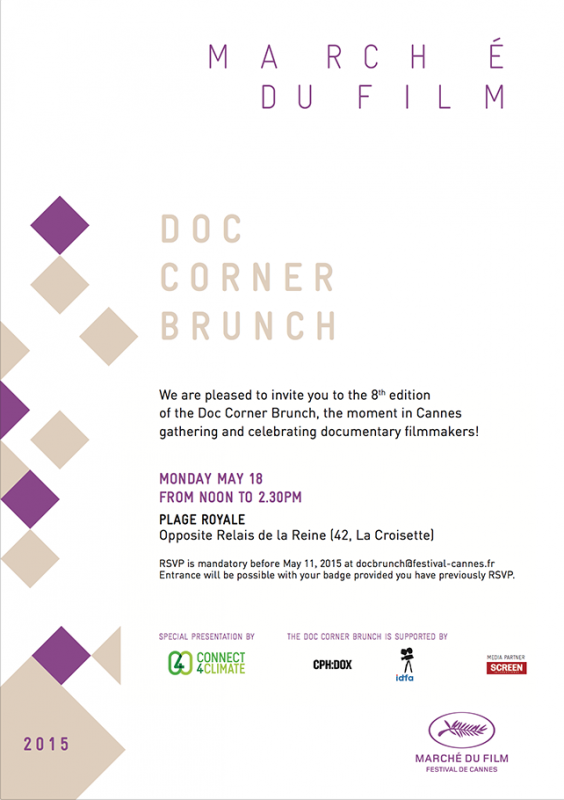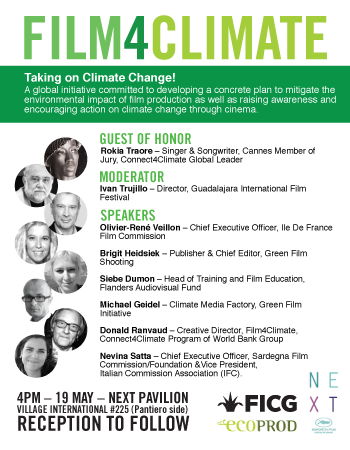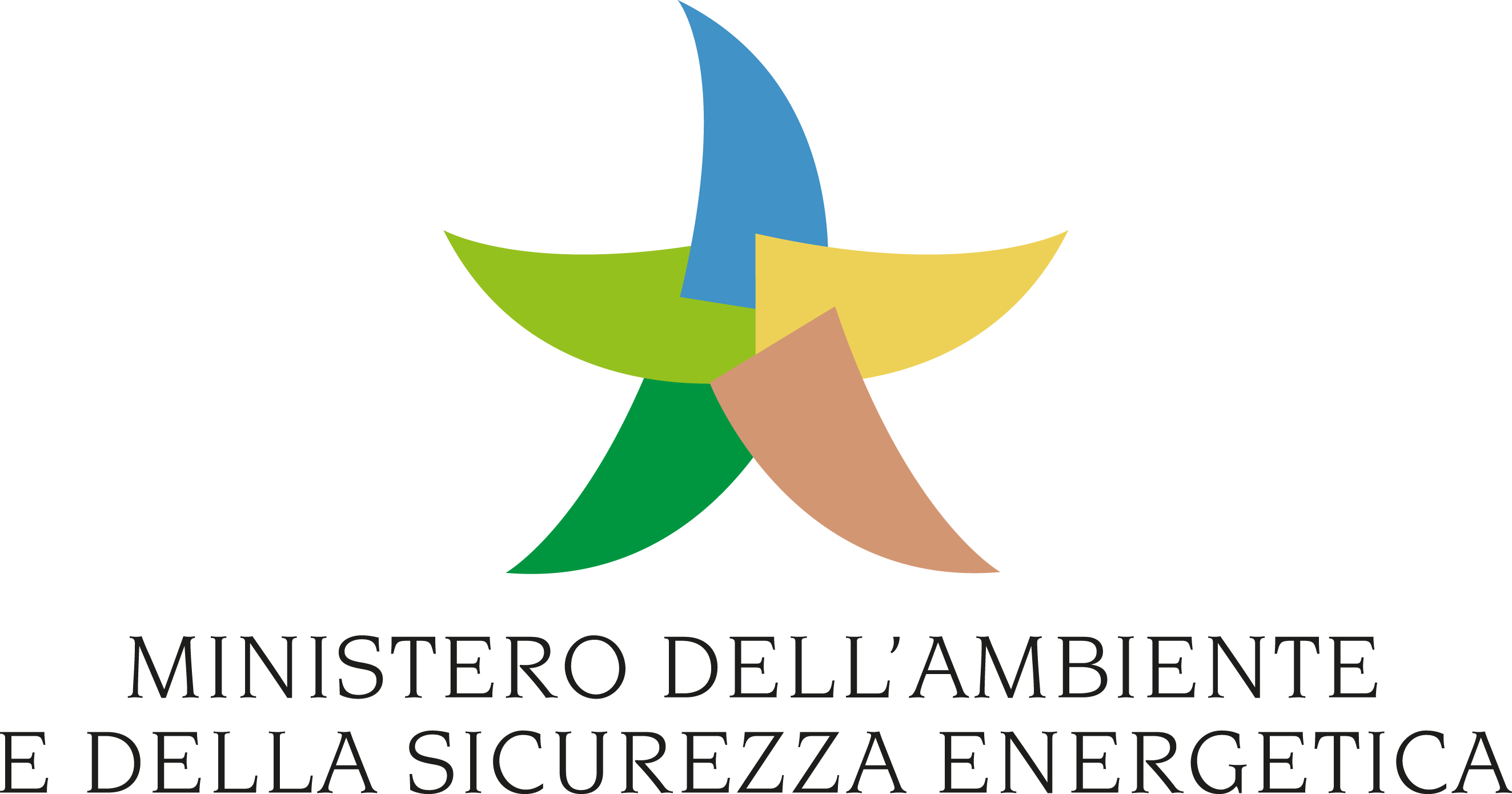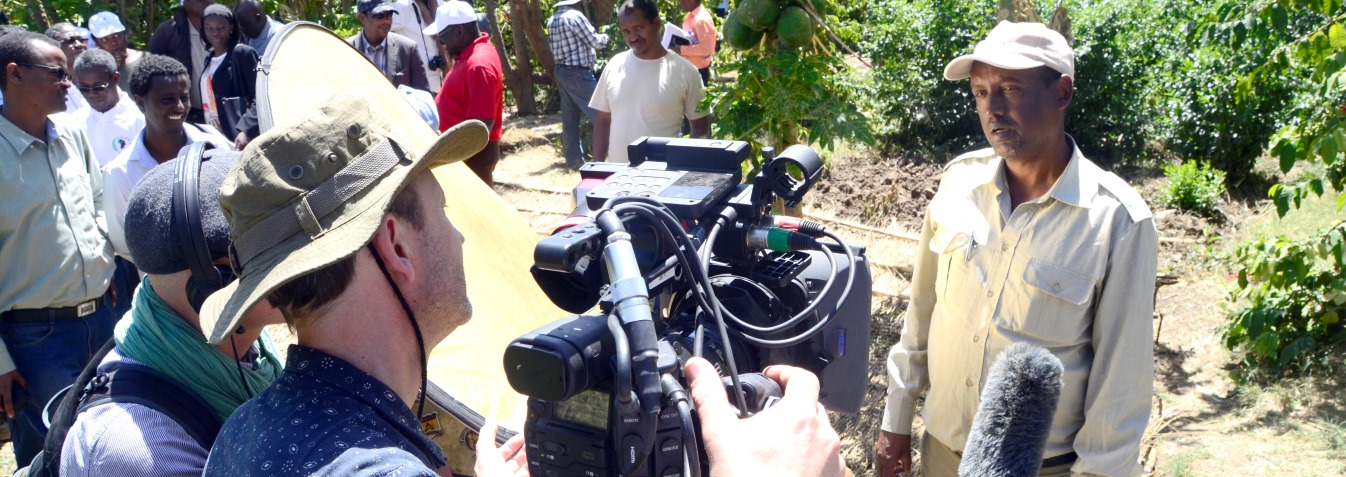
Once again, Connect4Climate travels to the Cannes Film Festival. This year, we're building and expanding Film4Climate, a global initiative committed to developing a concrete plan to mitigate the environmental impact of film production as well as raising awareness and encouraging action on climate change through the storytelling powers of cinema.
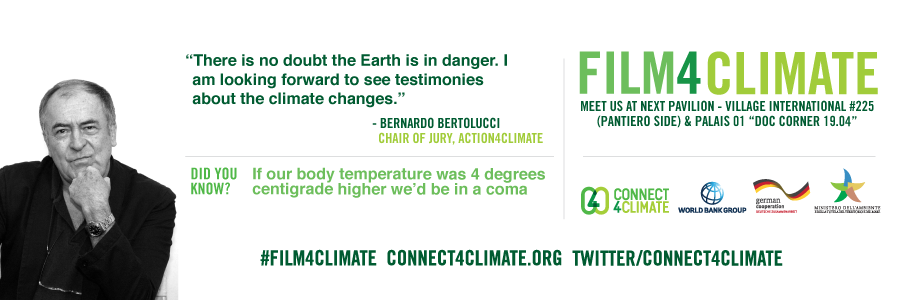
Why Film4Climate Now?
In December, years of climate change negotiations will conclude in Paris. Connect4Climate asks: What can the film industry do to help influence the outcome and contribute to climate action?
Cinema often helps raise awareness on social issues, but film production also consumes vast amounts of energy and resources. We're seeing signs of commitments from film executives to reduce the environmental impact in the industry and advocate for change through story content.
Can we join forces under a common “Film4Climate” initiative, establish globally recognized standards, and encourage more people to take on climate change?
Find us at Cannes
Bios of Panelists
 Rokia Traore
Rokia Traore
Born in Kati, Rokia Traor grew up between Mali, Europe and the Midde East. She started writing aged just 12 and the Bambara language translations became some of her first songs. Hailed as an African revelation in 1997 thanks to the success of her first album Mouneissa, she followed up with Wanita (2000), Bowmbo (2003), Tchamantch (2008) and Beautiful Africa, her most recent album, released in 2013. In keeping with the ideal of universality that had always governed her, Rokia Traor contributed to the 2005 show, "Billie and Me" devoted to Billy Holiday, featured on the soundtrack to the film Kirikou and the Wild Beasts, reinterpreted Mozart (Wati for Peter Sellars New Crowned Hope project) and worked with Toni Morrison on Desdemona in 2012. She is currently recording her next album, slated for 2016. She is a member of the jury for Festival de Cannes and is a global leader for Connect4Climate.
 Olivier-Ren Veillon
Olivier-Ren Veillon
Former student of the Ecole Normale Suprieure, Olivier-Ren Veillon used to be studies manager at SOFRES before working at La Compagnie Gnrale de Vidocommunication as an adviser. He then became the executive director of TV Sport (Eurosport France), the first thematic multilingual channel.He took part in the creation of Arte as Communication, Development and Business Director of la Sept-Arte and then became Managing Director of its subsidiary ARTE/VIDEO. As the Chief Representative of TV France International, he was in charge of the promotion of French audiovisual programmes on the international market. International director of Tlimages group and Deputy director of MK2, Olivier-Ren Veillon is now the director of the public structure The Ile de France Film Commission. Olivier-Ren Veillon also teaches at the Ecole Suprieure de Commerce de Paris (top French management school) and at the Ibero-american University of Mexico. He wrote several essays on visual arts and cinema, including The American Cinema.
 Birgit Heidsiek
Birgit Heidsiek
Birgit Heidsiek, a graduate in Political Science, has been a journalist covering national and international media for many years. In addition to her work as a writer/editor, she is the publisher of Green Film Shooting magazine and the independently produced Branchen Bulletin serie. She also works in a Public Relations capacity in Broadcasting and Post Production. At the Bonn-Rhein-Sieg University of Applied Sciences, where she is a member of the faculty, she teaches courses in the Electrical Engineering, Mechanical Engineering, and Technical Journalism departments.
 Siebe Dumon
Siebe Dumon
Siebe Dumon is Head of Training at Flanders Audiovisual Funds (VAF) since 2007. The aims of the training department are twofold: (1) to guide young filmmakers towards the professional world; (2) to support advanced filmmakers in their constant professionalization. Several instruments were installed to reach this double goal: providing coaching; organizing workshops and seminars; granting scholarships, etc. By launching e-Mission in 2012, Siebe Dumon put sustainable filmmaking on VAFs agenda, developing and implementing a methodology for more sustainable film production. Birgit Heidsiek, a graduate in Political Science, is a journalist who has been covering the national and international media for many years. In addition to her work as a writer/editor for publications such as the German film trade magazine Filmecho Filmwoche and the European online platform Cineuropa, she is the publisher of Green Film Shooting as well as the independently-produced Branchen Bulletin magazines. She also works in a Public Relations capacity in Broadcasting and Post-Production. At the Bonn-Rhein-Sieg University of Applied Sciences, where she is a member of the faculty, she teaches courses in the Electrical Engineering, Mechanical Engineering, and Technical Journalism departments.
 Donald Ranvaud
Donald Ranvaud
Donald Ranvaud is a British film producer and film journalist. He has had producing roles on a number of Oscar-nominated films including The Constant Gardener (2005), City of God (2002), Central Station (1998) and Farewell My Concubine (1993). He is now best known for his work in the Latin American film industry, especially in Brazil and Bolivia. He is the Creative Producer for the Film4Climate initiative of Connect4Climate, a World Bank Group climate change communication program.
 Michael Geidel
Michael Geidel
Michael is a graduated Media Economist, Researcher and awarded film producer and has been working in the media industry since 1999. He worked at TV-Licensing and Merchandising company EM.TV, KirchGroups International Co-Production Dept., on US Commercials for e.g. Warners out of Toronto, at ZDF-Enterprises and the main program planning unit at ZDF itself. Michael also worked for the EU at the Free State of Saxony in Brussels and long-term at leading German indie film production and distribution company Kinowelt (now Studiocanal). At the multi-awarded Climate Media Factory research project, a collaboration between the renowned film university Konrad Wolf in Potsdam-Babelsberg and the leading Potsdam Institute for Climate Impact Research he was concepter and analyst developing new film and interactive formats for communicating sustainability matters to a broad audience and consulted on projects like e.g. Ubisofts game ANNO 2070. Michael there co-founded the Green Film Initiative (GFI) and is since then collaborating with film industry players like film funds, broadcasters, non- and -governmental institutions in Germany, Europe and the USA including Filmfoerderung Hamburg Schleswig-Holstein, PGA Green, BFIs Greeningfilm, FilmLondon, Frances Ecoprod, BBC and BAFTAs Albert and is part of the E.B.U.s Green Broadcasting project to promote and support sustainable filmmaking. Michael researches on Innovation and Sustainability in the media and film industry at GFI, on Interactive Television at MIZ Media Innovation Center Babelsberg, is Berlin film festival Talent Campus expert, member of different film festival juries and lectures at universities and on panels in Germany and abroad. Michael contributed to and produced a variety of film, multi-platform and interactive projects and received awards for his work.
 Nevina Satta
Nevina Satta
Nevina is the CEO of Sardegna Film Commission/ Foundation and the Vice-President of the Italian Film Commission Association (IFC). Born in Sardinia, she got her Philosophy degree and Cultural -Media Studiesand Visual Anthropology PhD in Milan, where she began her career as Filmmaker and Producer. Before returning to her homeland after twenty years, she was based in Los Angeles and Milan, developing and producing narrative features and documentaries. Professor of Film Producing and Directing in various EU Universities, she also worked as consultant of International Film Festivals and as architect of training initiatives (including Locarno Film Summer School for 18 years and African Asian Latin American Film Festival of Milan). She has founded with her husband the Unicef-endorsed NGO TravelingFilmSchool. She'sspecializing on Sustainability in the Creative Industries and Audiovisual Industry Funds and Institutions.
About Film4Climate
Film4Climate is a global initiative committed to developing a concrete plan to mitigate the environmental impact of film production as well as raising awareness about climate change. The objective is two-fold: One--unify the film industry under one globally recognized standard for sustainable productions; and two--develop a global commitment from industry signatories who pledge to meet the standard, reduce the environmental impact, and participate in encouraging climate change awareness and action.
To do this, well spend the next few months establishing a network of knowledge partners representing the industrys practitioners and associations (e.g. Film Institutes, Film Commissions, Studios, Production Companies, and International Film Festivals). The partners will work together to share insights, experiences, and practical tools to achieve the goals.
We aim to share the results with an international audience during events taking place at the United Nations Climate Change Conference (COP21) in Paris, France, from November 30 - December 11.
Several excellent templates have been devised by studios in the USA and Europe along with self-regulating, free software that allows producers to establish the projected carbon footprint for the production of the upcoming venture, based on scripts, breakdowns, and schedules. Signing up for the program allows the subscriber to enter the actual data during the production to learn if it is possible to reduce the overall carbon footprint by the end of the process.
Connect4Climate has discussed this idea at previous film festivals and events: We announced it at the Berlin International Film Festival, and discussed it at the Stockfish European Film Festival in Reykjavik, Iceland, at the Guadalajara Film Festival, the largest festival in Latin American, and most recently at a screening of Chloe & Theo at the World Bank Group headquarters. Now, we keep building momentum in France at the Cannes International Film Festival, held from May 13-24.
Stay tuned!
